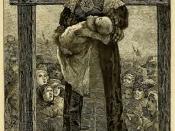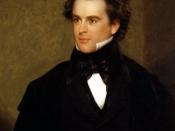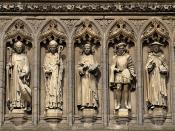The Greatest Sinner Nathaniel Hawthorne's romantic novel The Scarlet letter focuses on three characters affected by a single, passionate sin. Roger Chillingworth tortures Hester Prynne and Arthur Dimmesdale, the two lovers that commit the passionate sin. In so doing, Chillingworth commits a greater sin that is based on principle and motivated by revenge. In addtion, Chillingworth's desire to harm Dimmesdale causes Roger to change from a sane man into a heartless monster.
The sin committed by Chillingworth is far greater than that of Hester and Dimmesdale. For example, Dimmesdale explains Chillingworth's sin when he says, "There is one worse than even the pollited priest! That old man's revenge has been blacker than my sin. He has violated, in cold blood, the sanctity of the human heart. Thou and I, Hester, never did so!" The sin of Dimmesdale and Hester was made out of passion and was not intentional. The two lovers merely followed the natural path of falling in love.
Chillingworth, on the other hand, intentionally tortures Dimmesdale out of personal reason and hatred. Chillingworth's evil motives make him a greater sinner. Furthermore, Chillingworth never tries to make reparations for his sin; rather, he becomes more vengeful as time wears on. Hester and Dimmesdale were properly punished for their sin, but Roger was not. Therefore, Chillingworth does not recognize his wrongdoing. Chillingworth's lack of conscience augments his sin. Also, it makes him seem more evil.
Revenge caused Chillingworth to change his character. In the beginning of the novel, Chillingworth showed sympathy and compassion. He cared for Hester and Hester's child who was the root of his anguish. Chillingworth was originally a benevolent person, but revenge would soon change that. Through most of the novel, Chillingworth sought to torture Dimmesdale because he violated Chillingworth's property. Hester said Chillingworth "had become a fiend for his(Dimmesdale's) especial torment." His only purpose was to destroy Dimmesdale. Chillingworth was not aware that he had become a heartless monster fixed on revenge. By the end of the novel, Chillingworth loses all the benevolence that he once had. He turns into an old man with a mind taken over by his own thirst for revenge. Roger dies at the end, but his soul died somewhere at the beginning.
Arthur Dimmesdale and Hester Prynne's sin can be justified because they acted through raw emotion and passion. Roger Chillingworth's sin cannot be justified because he acted through selfishness and hatred. Ironnically, we find that a passionate sin causes a despicable sin.


![[Roger Bresnahan, St. Louis, NL (baseball)] (LOC)](https://s.writework.com/uploads/7/79036/roger-bresnahan-st-louis-nl-baseball-loc-thumb.jpg)


